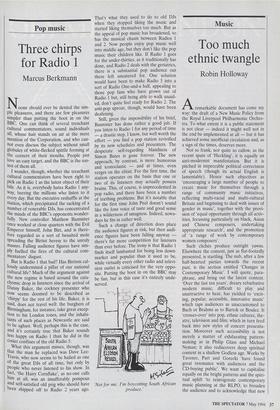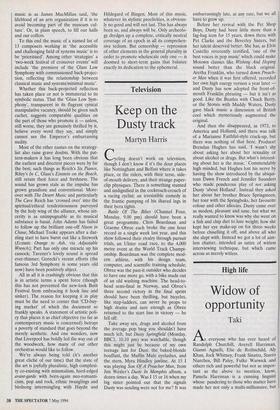Music
Too much ethnic twangle
Robin Holloway
Aremarkable document has come my way: the draft of a New Music Policy from the Royal Liverpool Philharmonic Orches- tra. To what extent it is a public statement is not clear — indeed it might well not in the end be implemented at all — but it has achieved some unofficial circulation and, as a sign of the times, deserves more.
Not so frank, nor quite so callow, as the recent spate of 'Heckling', it is equally an anti-modernist manifestation. But it is pitched in impeccable political correctness of speech (though its actual English is lamentable). Hence such objectives as `encouraging a large number of people to create music for themselves through a range of community music initiatives, reflecting multi-racial and multi-cultural Britain and beginning to deal with issues of gender in music', together with the provi- sion of 'equal opportunity through all activ- ities, focussing particularly on black, Asian and Chinese composers, undertaking appropriate research', and the promotion of 'a range of work by contemporary women composers'.
Such clichés produce outright yawns. Elsewhere the content, just as flat-footedly presented, is startling. The nub, after a few half-hearted pieties towards the recent past, is the section entitled 'Changes in Contemporary Music'. I will quote, para- phrase, and bring out the latent content. `Over the last ten years', dreary rebarbative modern music, difficult to play and unattractive to hear, has yielded to 'excit- ing, popular, accessible, innovative music' which taps audiences as unaccustomed to Bach or Brahms as to Bartok or Boulez. It `crosses-over' into pop, ethnic cultures, the- atre, television and film; which in turn feed back into new styles of concert presenta- tion. Moreover such accessibility is not merely a matter of exhilarating pattern- making as in Philip Glass and Michael Nyman; it also rediscovers deep spiritual content in a shallow Godless age. Works by Tavener, Part and Gorecki 'have found great resonance with audiences and the CD-buying public'. We want to capitalise equally on the bright patterns and the spiri- tual uplift `to reinvigorate contemporary music planning at the RLPO, to broaden the audience and to acknowledge that new music is as James MacMillan said, 'the lifeblood of an arts organization if it is to avoid becoming part of the museum cul- ture'. Or, in plain speech, to fill our halls and our coffers.
To this end the music of a named list of 13 composers working in 'the accessible and challenging field of systems music' is to be 'prioritised'. Among other 'strategies' a `two-week festival of crossover events' will include 'the premiere of the Glass Low Symphony with commissioned back-projec- tion, reflecting the relationship between classical music and systems/minimal music'.
Whether this back-projected reflection has taken place or not is immaterial to its symbolic status. That the 'Glass Low Sym- phony', transparent in its flagrant cynical manipulative vacancy, should be given such cachet, suggests comparable qualities on the part of those who promote it — unless, still worse, they are genuinely thrilled by it, believe every word they say, and simply cannot see the Emperor's embarrassing nudity.
Most of the other names on the strategy- list also raise grave doubts. With the pat- tern-makers it has long been obvious that the earliest and directest pieces were by far the best; such things as Reich's Six Pianos, Riley's In C, Glass's Einstein on the Beach, still retain their force and freshness. The sound has grown stale as the impulse has grown grandiose and conventional. More- over with The Desert Music and particularly The Cave Reich has 'crossed over' into the spiritual/ethical tendentiousness purveyed by the holy wing of the alliance, whose sin- cerity is as unimpugnable as its musical substance is banal. John Adams has failed to follow up the brilliant one-off Nixon in China; Michael Tooke appears after a daz- zling start to have burnt out like a firework (Ecstatic Orange to Ash, via Adjustable Wrench); Part has only one miracle up his cassock; Tavener's lovely sound is spread ever-thinner; Gorecki's recent efforts (the famous 3rd Symphony is some years old now) have been positively abject.
All in all it is crashingly obvious that this is in artistic terms a spent force (though this has not prevented the new-look Bath Festival from embracing it hook line and sinker). The reason for keeping it in play must be the need to corner that 'CD-buy- ing market' of which the document so frankly speaks. A statement of artistic poli- cy that places it as chief objective (so far as contemporary music is concerned) betrays a poverty of standard that goes beyond the merely aesthetic. And one wonders, now that Liverpool has boldly led the way out of the woodwork, how many of our other orchestras would like to follow.
We're always being told (it's another great cliché of our time) that the state of the art is joyfully pluralistic, high complexi- ty co-existing with minimalism, hard-edged avant-garde with born-again neo-romanti- cism, pop and rock, ethnic twanglings and birdsong intermingling with Haydn and Hildegard of Bingen. Most of this music, whatever its stylistic proclivities, is obvious- ly no good and will not last. This has always been so, and always will be. Only archeolo- gy dredges up a complete, critically neutral coverage of an epoch in all its comprehen- sive tedium. But censorship — repression of other elements in the general plurality in order to promote wholescale only one — is doomed to short-term gains that balance exactly its dedication to the ephemeral.



















































 Previous page
Previous page